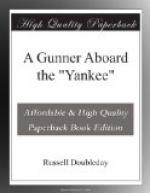“She didn’t go in to fight,” said “Hay.” “They were to block up the channel with her.”
“To block up the channel?”
“Yes. Cervera and his fleet are in the harbor, you know, and the scheme was to keep them from coming out.”
“Did they succeed?” chorused the whole group of eager listeners.
“Yes, but——”
The conclusion of “Hay’s” sentence was drowned in a wild whoop of joy, a whoop that brought a number of other “Yankees” to the spot, and also a gesture of remonstrance from the executive officer on the bridge.
“Wait, boys,” I said, gently; “you haven’t heard all.”
There was quiet at once.
“Hobson and his brave men succeeded in accomplishing their object, but they have paid the penalty for it.”
“Not dead?” asked one in almost a whisper.
“So the captain read the signals. The ‘Merrimac’ went in about three o’clock this morning. It seems she reached the channel all right, but she was discovered and sent to the bottom with all on board.”
“Hay” took off his cap reverently, and the others instantly followed his example. Nothing more was said. The glory of the deed was overshadowed by the supposed fate of the gallant volunteer crew.
The “Yankee” steamed in to a position designated by the flagship, and the captain went aboard to pay his respects to Admiral Sampson. A Spanish tug, flying a flag of truce, which had emerged from the harbor at noon, met one of our tugs, also flying a flag of truce, and almost immediately a string of signals went up to the signal yard of the “New York.”
Then came such a burst of cheers and whistling and tossing of hats from every ship in the fleet that it seemed as if every officer and sailor in Sampson’s squadron had suddenly gone daft. Like wildfire, the glorious news spread—
Hobson and his men were safe!
The tug from the harbor had brought an officer sent by Admiral Cervera himself with a message stating that the brave naval constructor and all his crew had been captured alive and were now prisoners in Morro Castle. Later, a press boat came alongside and confirmed the news through a megaphone.
The excitement on board the “Yankee,” like that throughout the fleet, was tremendous. Those in the North who had received both the news of the feat and the rescue at the same time, can hardly understand the revulsion of feeling which swept through the American ships gathered off Santiago. It was like hearing from a supposed dead friend.
These heroes were comrades—nay, brothers. They wore the blue and they were fighting for Old Glory. Their praise was ours and their deed redounded to the eternal credit and fame of the American navy. Small wonder that we welcomed the news of their safety, and cheered until our throats were husky and our eyes wet with something more than mere exertion.
All hail to Richmond Pearson Hobson and his men!




